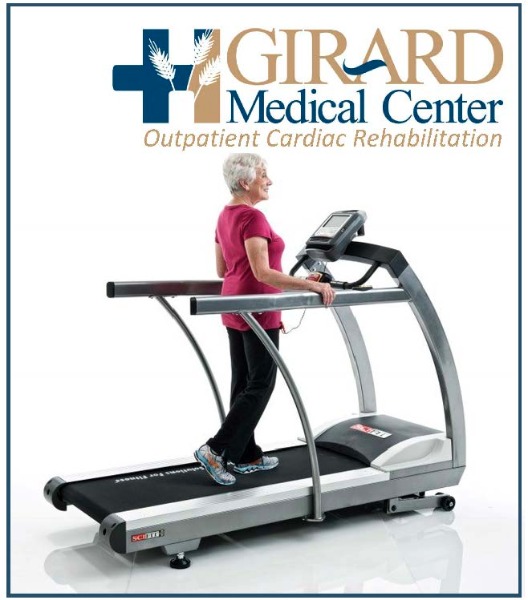About Our Cardiac Rehabilitation Program
Who participates:
Cardiac rehab is an option for people of all ages and with many forms of heart disease. Some of the conditions and treatments where rehab can help include:
-
Heart attack
-
Coronary heart disease
-
Chest pain (angina)
-
Coronary artery bypass surgery
-
Angioplasty and stents
-
Heart transplant
-
Heart valve replacements or repairs
Our cardiac rehab program spans phases II and III:
-
Phase II: As soon as you leave the hospital, you begin an outpatient program that encourages you to gradually increase your activity level under our close supervision.
- Phase III: Lasting success results when you commit to long-term maintenance and a heart-healthy lifestyle.
Cardiac rehab isn’t right for everyone. Your doctor and the rehab team will evaluate your health to make sure it’s a good fit for you.
Medical evaluation:
The team will assess your health at the start and throughout the program. They’ll look at:
-
Physical ability
-
Medical limits
-
Other conditions
- Risk factors for heart disease, stroke and high blood pressure
Using this information, they will design a program that’s safe and effective just for you.
Physical activity:
Based on your ability, you may:
-
Walk
-
Cycle
-
Jog
- Do other endurance activities
You also may do strength-building exercises. Don’t worry if you have never exercised before. The team will make sure you move at a comfortable pace that’s safe for you. They also will help you learn to warm up and stretch before exercise. They will help you work up to exercising three to five times a week.
Lifestyle education:
Our staff will assist you with lifestyle changes to help you feel better and reduce your risks. They will help you:
-
Learn about lifestyle changes and habits, such as smoking cessation
-
Manage pain or fatigue that may be part of your heart condition
-
Make sure you take your medicines correctly
- Assist with development of a home exercise program
Our dietitian will meet with you to:
-
Address personal health and nutrition goals
-
Create an individualized plan to aid in weight control and lower blood pressure and cholesterol
-
Teach you healthy living skills
Support:
Adjusting to a heart problem often takes time. You may feel depressed or anxious, lose touch with your social support system or have to stop working for several weeks. If you get depressed, don’t ignore it. Depression can make your rehab program harder. It also can affect your relationships and other areas of your life and health. Counseling will help you learn healthy ways to cope with depression and other feelings. Your doctor also may suggest medications such as antidepressants.
Cardiac rehab helps you rebuild your life, both physically and emotionally. As you get stronger and learn how to manage your condition, you’ll likely return to a normal routine and enjoy life more. It’s important to know that your success rests largely with you. The more dedicated you are to following the program, the better you’ll do.
Your personalized program:
We will tailor your rehab program to fit your specific needs. You may have friends or relatives whose cardiac rehab is different from yours. Most cardiac rehab programs last about eight to twelve weeks. During that time, you will work with our team of professionals.
Here’s an idea of what to expect, during your rehab program:
Early recovery – Phase II:
This phase starts when you leave the hospital. You will attend Cardiac Rehab for six to 12 weeks. You will increase your activity gradually, under close watch. The team also might suggest exercises you can safely do at home, such as walking and gentle calisthenics. You will learn about eating a healthy diet, quitting smoking, coping with your condition, resuming sexual activity and finding social support.
Ongoing recovery – Phase III:
This is a long-term program – something to follow for the rest of your life. By this point, you probably will have developed your own exercise routine at home or at a local gym. You also may continue to exercise at Cardiac Rehab program. If you have special health concerns, you may remain under medical supervision during this time. Counseling and education about nutrition, lifestyle and weight loss also may continue. For best success, make sure your exercise and lifestyle practices become lifelong habits.
It may be hard to start a cardiac rehab program when you’re not feeling well, but you’ll benefit in the long run. Cardiac rehab can guide you through fear and anxiety as you return to an active lifestyle, with more motivation and energy to do the things you enjoy.
Ask your doctor for a referral
The program requires a doctor referral. Our team will consult with your doctor and evaluate your health to make sure the program is appropriate for you.
Contact information
Girard Medical Center
Cardiac Rehab
322 N. Hospital Drive
Girard, KS 66743
620-724-5126


 Launch the media gallery 1 player
Launch the media gallery 1 player